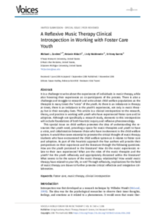Abstract
It is a challenge to write about the experiences of individuals in music therapy, while also honoring their experiences as co-participants of the process. There is also a challenge and struggle to research and write about child welfare populations as the therapist is many times the “voice” of the youth. As there is an imbalance in therapy at times, there is an imbalance in the youth’s experiences, not only in music therapy but in their everyday lives. This article is a clinical introspection to the research, theory, and practice in working with youth who have experienced foster care and/or adoption. Although not specifically a research study, elements to this introspection will include foundations of both heuristic inquiry and reflexive phenomenology.
This special issue on child welfare promotes the idea of understanding the resources that youth need, providing a space for music therapists and youth to have a voice, and collaboration between those who have involvement in the child welfare system. It would then seem essential to promote the critical thought of music therapy students who have encountered the child welfare system as it relates to foster care and adoption. As part of this heuristic approach the four authors will provide their perspectives on their experience and the literature through the following questions: How are the youth perceived in the literature? How do the music experiences relate to their own experiences? What are the roles of the music therapist and the youth? Are the youth reflexively and appropriately discussed within the literature? What seems to be the nature of the music therapy relationship? How would music therapy have related to your life, or not? Through reflexivity, implications for the field of music therapy are drawn to further promote critical reflection and integrative collaboration.
This article is included in the Voices Special Issue on Music Therapy and Child Welfare.

